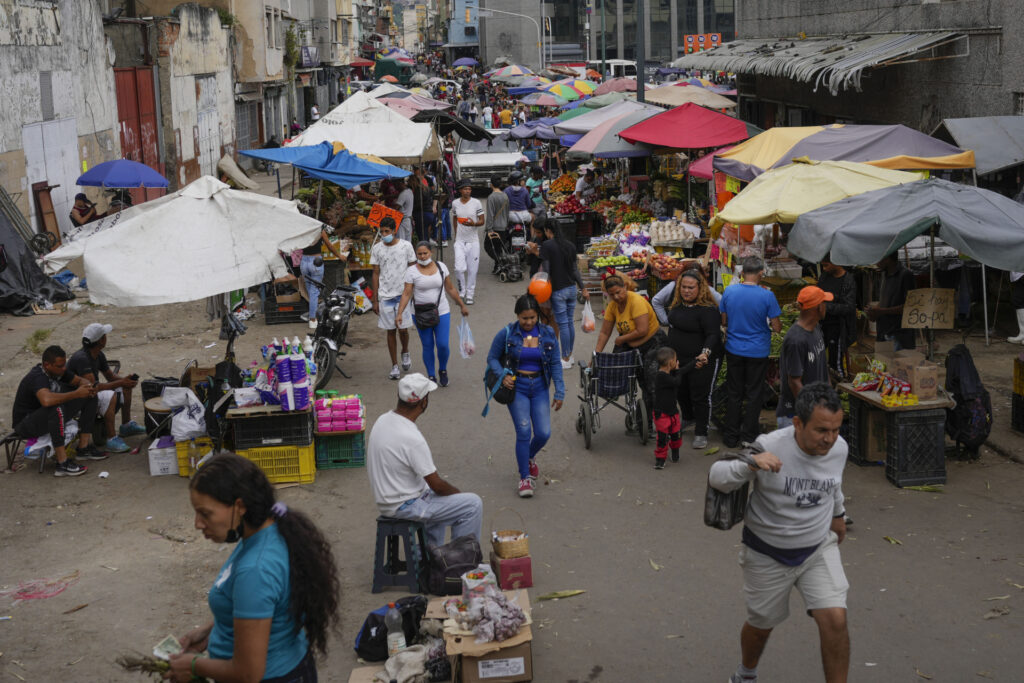
Caruzo: My Country Tried Kamala-Style Price Controls — It Led Venezuela to Disaster
U.S. Vice President Kamala Harris is reportedly planning to introduce a price control scheme for food and groceries in America should she be elected – an alarming proposal to hear as a Venezuelan, who experienced the rampant shortages and economic chaos of price controls in the flesh.
I lived through the majority of the past 25 years of the disaster known as Venezuela’s socialist revolution, having only been able to flee from Venezuela a couple of months ago. Throughout the past 20 years or so, late socialist dictator Hugo Chávez and then his successor, Nicolás Maduro, signed off on several iterations of price controls in the same style as Harris’s reported policies, each one more disastrous than the last.
The prospect of buying things “cheaper” due to price controls may seem enticing. Who wouldn’t love to save a couple dollars here and there, especially under Bidenflation, which every single one of my American friends has been slammed by. But roughly two decades of price controls in Venezuela ultimately gave forth to severe shortages, rationing, corruption, and just unpleasant experiences and misery all around.
Get ready for the “joy” of bread lines!
Don’t exceed your coconut rations!
Black markets are so brat! pic.twitter.com/sU9IqvBXmN— Breitbart News (@BreitbartNews) August 15, 2024
It got so bad that the Maduro regime, while still officially implementing price controls, has quietly stopped enforcing them for the most part. They have not publicly said why but, maybe, they finally realized how disastrous it is.
Venezuela’s price control disaster is a two-decades-old tale that began in early 2003. At that time, Hugo Chávez established severe price controls and imposed strict profit margins on meat, chicken, cheese, sugar, coffee, beans, milk, and other items. I remember that, for a time, the plan seemed to “function,” but this only lasted for so long and, by the late 2000s, shortages of the regulated items were commonplace. The price controls, together with inflation, led to situations where a kilogram of onions was more expensive than a kilogram of meat.
It’s very simple, really: who would want to produce and sell items at a loss? And if you do, how long can you sustain that? Not for long.
By 2011, Chávez doubled down on price controls. In addition to what was already subject to price regulations, Chávez added water, fruit juice, soap, bleach, dishwasher soap, detergent, toiletries like shampoo soap and deodorant, toilet paper, and even diapers to the list.
The new price control scheme sought to punish “capitalist” traders who “speculated” against the people by further imposing disciplinary actions should they disrespect the profit margins established by the socialist regime. Chávez said that the regulatory scheme was a new mechanism for the “transition to socialism” and a socialist economy that puts an end to the “vices of capitalism.”
Hugo Chávez died in 2013, but unfortunately, the price controls did not die with him.
If Chávez had doubled down on price controls before dying, Maduro tripled down on what he inherited. The rest is a tale you may already know: severe ID-based rationing of the regulated items and the implementation of fingerprint scanners to further clamp down on regulations, and just sheer socialist absurdity.
File/Customers walk through a public market in the Quinta Crespo neighborhood of Caracas, Venezuela, Dec. 11, 2022. Half of Venezuelan households do not receive enough income to cover the Food Basket, which puts them in a situation of extreme poverty, according to the 2023 Living Conditions Survey released Wednesday, March 13, 2024. (AP Photo/Matias Delacroix, File)
To give you an example of how bad it all got with price regulations, in 2015, Maduro regime officials came up with a convoluted math “formula” to set a regulated price for eggs. The price was unrealistic and unsustainable by all measures, to the point that I vividly remember my mother telling me not to throw away the cardboard packaging that the eggs came in because, without it, a nearby market would not sell us eggs. The eggs were so over-regulated that they ended up costing far less than the two pieces of cardboard.
The price regulation of toiletries led to personal situations where I had to get some of them through an off-market “dealer.” These exchanges, often taking place at a street corner near my old apartment, felt like I was doing some shady illegal stuff like purchasing drugs — but no, there I was, buying bar soap to wash my hands and shower, a luxury for when there was actually running water, but that’s a whole other tale.
In late 2018, I went to this store near my home that sold toiletries, perfumes, and other goods in search of soap and shampoo. During those days, the National Guard had staged an “intervention” on the store and they were only letting people purchase one item regardless of what it was. After a long, long line, I ended up only being able to purchase something that was not exactly shampoo, but it would have to do for both me and my brother to wash our hair with.
The price regulations also hit medicine, leading to severe shortages of even the most basic pills, as no one could realistically manufacture them at a loss forever. This led to inhumane situations where I could not even find Omeprazole for my mom’s stomach woes, or antacids during the times when she was receiving chemotherapy for her liver cancer — an incomplete treatment, by the way, as the Maduro regime, which controlled medicine imports, had long caused a health crisis through socialist mismanagement and stopped importing certain treatments. Maduro’s policies condemned thousands, including my mother, to death due to a lack of the complete required life-saving treatment. This continues to this day.
Antacids were also hard to find after the Maduro regime banned them alongside other items to prevent protesters from using them. As I could not find antacids, all I could do was give her water with baking soda.
The ID and fingerprint-based rationing of items also created an informal bartering system. For example, I was entitled to purchase a certain amount of diapers or baby food per week. I had no need to purchase either of them because there were no babies in my family, but there were parents who needed them.
What was common practice during those days was that I’d spend my weekly diaper allotment for someone else, who would in turn buy something I needed from his or her weekly allotments. Then, once we were out of the eyes of the National Guard or police, we’d trade the items and settle monetary differences.
What was the socialist regime’s “solution” to this? Demanding that parents show their babies’ birth certificates to be eligible to purchase diapers.
RELATED: Billboard of Maduro Set Ablaze Amid Venezuelan Election Protests
If you as a company would not produce toilet paper (at a loss), what was the Maduro regime’s response? Forcefully occupy your factory to make it produce toilet paper at gunpoint, leaving you with the losses.
Certain food companies that produced regulated items like rice or Venezuela’s flagship corn flour were able to offset some of the losses by also producing variants or other products that were not subject to the regulation, such as a specialized corn flour mixture to make cachapas (a sort of corn pancake). The Maduro regime responded to this practice by banning the production of said items.
As I mentioned, these regulations, while still active, are not being enforced, as the Maduro regime has other pressing matters to worry about, such as negotiating with the Biden administration or stealing sham elections. This means that toilet paper, eggs, and other once hard-to-find items can now be easily found on shelves, but for capitalist U.S. dollars instead of socialist bolivars.
If you need another example of the consequences of price controls, look to Cuba’s Castro regime, which announced new price controls in July as part of its “war-time economy” proclamation that seeks to “save socialism” in Cuba, a nation ruined by six decades of price communism.
Argentina, under the socialist government of alleged wife-beater Alberto Fernández, also insisted on price controls throughout Fernández’s disastrous presidency, claiming they would help fight off inflation — which they didn’t. President Javier Milei eliminated the price controls in January, among other policies eliminating socialist economic micromanaging, and inflation in Argentina has dramatically reduced every month as a result.
Christian K. Caruzo is a Venezuelan writer and documents life under socialism. You can follow him on Twitter here.
Originally Posted At www.breitbart.com
Stay Updated with news.freeptomaineradio.com’s Daily Newsletter
Stay informed! Subscribe to our daily newsletter to receive updates on our latest blog posts directly in your inbox. Don’t let important information get buried by big tech.
Current subscribers:



